Comparative Critical Discourse Analysis of Quranic Translations: A Study of Maulana Maududi and Javed Ghamidi's Interpretation of the Verse 256 of Surah Al-Baqarah
DOI:
https://doi.org/10.5281/zenodo.13778330Keywords:
Comparative Critical Discourse Analysis, Surah Al-Baqarah (2:256), religious freedom, Islamic discourse, Maulana Maududi, Javed GhamidiAbstract
This paper employs comparative discourse analysis to examine Maulana Maududi and Javed Ghamidi's interpretations of a part of the verse in Surah Al-Baqarah (2:256) in the Quran. Applying Fairclough's theory as the foundation, comparative CDA sheds light on linguistic variations, discourse structures, and ideological foundations for in depth exploration of the debate. The analysis encompasses textual, discursive, and social dimensions to uncover differences in lexical choices and rhetorical devices used by each author and reveals differing perspectives within the language construction of both translations influenced by historical, cultural, and intellectual factors. Specifically, it contrasts Maududi's assertive political language with Ghamidi's more rational and adaptable writing style. The power structures and ideological influences in society reflect Maududi's emphasis on an Islamic state compared to Ghamidi's contextual, rational Islam. Translations impact societal dynamics by reinforcing specific interpretations, such as Maududi's clarity on doctrine or Ghamidi's promotion of individual autonomy. This research expands our understanding of diverse viewpoints within the Islamic discourse on religious freedom and coercion in the translation of the verse.
Downloads
Published
How to Cite
Issue
Section
License
Copyright (c) 2024 Jabreel Asghar

This work is licensed under a Creative Commons Attribution-NonCommercial 4.0 International License.
This is an open-access journal which means that all content is freely available without charge to the user or his/her institution. Users are allowed to read, download, copy, distribute, print, search, or link to the full texts of the articles, or use them for any other lawful purpose, without asking prior permission from the publisher or the author. All articles are available on the internet to all users immediately upon publication. Non-commercial use and distribution in any medium are permitted, provided the author and the journal are properly credited.











 Research Journal Indexed by Google Scholar
Research Journal Indexed by Google Scholar